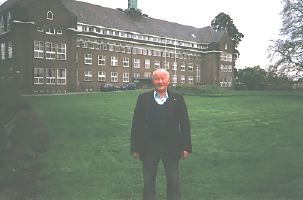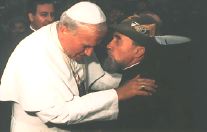dehoniana
informationes
N. 2-98 -- 25 April, 1998
R.I.P.: Srs. Leonarda and Doralice
Srs. Leonarda and Doralice died
at Gandino (Bergamo), the first on April 1 and the second four days later.
Belonging to the Congregation of Ursuline Sisters, both worked in SCJ houses:
Sr. Leonarda at Albisola, Pagliare and Roma I; Sr. Doralice at Roma I.
Sr. Leonarda became famous as the Curia cook while the second was in charge
of laundry. The news took all of us by surprise and saddened those who
knew them.
Sr. Leonarda was born on 22 April at S.
Antonio d'Adda, Caprimo (Bergamo) and made her religious profession on
1 April 1943. She spent her entire life in service of priests and religious,
first at the Casa del Clero at Bergamo, then with us, and finally at the
episcopal residences of Rimini and Vigevano. She rendered her soul to God
on the day precisely when she had completed 55 years of religious profession.
The Superior General of the Ursulines who sent us the news noted that Sr.
Leonard was "the soul of discretion, both delicate and gentle" who treated
every person "with courtesy, respect, and veneration almost." This is exactly
as we saw her.
Sr. Doralice was born on 1 March 1915 at
Sabbio Bergamasco (Bergamo) and made her profession on 5 September, 1938.
She spent the last 22 years of her active life (1971-1993) at Rome I. The
Ursuline General described Sr. Doralice as a person who lived her consecration
in faithfulness to daily demands, particularly good at laundry work and
always ready to give helping hand as any need arose in the house. For us,
Sr. Doralice was noted for her dedication and love for order and for her
character which was at one and the same time demanding but loving. She
is remembered for the discipline she had while working and for her desire
to pray and to have others pray. She was the one who always began the rosary
when the community went on its occasion visiting tours.
May they rest in peace, in the lasting
joy of the elect. They have our sincere gratitude.
Br. Rutgerus Returns to Holland
Forty-two years after coming to
Rome I to work, Br. Rutgerus returned to his province and was assigned
to Nijmegen. This decision, which he made a year ago, only recently came
to pass. The morning of 6 April, with Fr. Adrian Borst and Br. Marek Skorski
in tow, Br. turned toward Holland. There were stops at Albino (IS) and
Freiburg (GE). The house van was used to transport the luggage and boxes
of souvenirs gathered during so many years in residence at Rome.
Saturday, 4 April, was the official send-off
day. During the Palm Sunday celebration at which the Superior General presided,
and at the banquet that followed, the person and work of Br. Rutgerus was
made the object of recognition and gratitude. In attendance, besides the
community, was a number of Dutch friends who were Roman residents.
 Rutgerus at St. Josefklooster
Rutgerus at St. Josefklooster
The landscape has been somewhat redone
as a result of the house remodeling, but the absence of Br. Rutgerus will
surely be felt. He became a classic figure, dressed entirely in blue, a
cigarette in his mouth, and a steady rhythm in his work. He will be missed
in chapel as well where his presence at every single exercise of prayer
was noted, his Dutch prayer book in hand. He will be missed in the dining
room, too, where he ate quietly and where everyone honored his seating
preference. Everyone will miss his little 'zingers', particularly the students
who 'study much and understand nothing'.
Rome I thanks Br. Rutgerus for his example
of fidelity, humility, and work.
P. Rudolf Bonci Becomes News in Uruguay
After some violent actions perpetrated
against taxi drivers this past January in some of the poorer sections of
Montevideo, the transportation unions decided to suspend bus and taxi service
in these areas for security reasons. The well-known parish, Lourdes Grotto,
is found in one of these zones. It is run by the members of the AU province.
People were naturally opposed to the decision
and the local SCJ community, in the person of the pastor, Fr. Rudolf Bonci,
supported them.
The local press made a big deal of the
event and devoted ample space to reporting it. It conducted interviews
with the pastor during which he sought to draw attention to the crucial
point -- education of youth and work for adults. He fingered the wound
of laicism which has afflicted the ruling class for over a century and
prevents any kind of collaboration with the Church in the area of education.
For some time now, the parish has desired to offer buildings to set up
a secondary school and has consistently run into the ideologically based
opposition of the State. "Send teachers, not police" was one of the statements
made by Fr. Bonci which framed the real problem and which received wide
circulation in the press. The fact that the crowds at the Lourdes Grotto
are among the boycotted traffic zones simply served to highlight the situation.
For several days the courageous attitude of Fr. Bonci held the attention
of the journalists some of whom supported him and some of whom stirred
up the people. One hopes that the event will lead to solutions not only
of problems that the people have but also to overcome the outdated attitude
of the State with regard to the social activity of the Church.
Fr. Giovanni Brevi (IS) has died
Fr. Giovanni Brevi of the North
Italian province died this past 31 January. He was the famous chaplain
of the Julia Corp of Alpine Troops and among the very last of the Italian
soldiers in Russia to return to Italy in 1954 after 12 years in prison
in one of Stalin's gulags. He was a legendary priest and had received the
Golden Medal for Military Valor very rarely given to a living person.
Fr. Brevi was born 24 June 1908 near Bergamo
and later moved with his family to Piedmont, He entered our apostolic school
at Albino as a young boy and made his religious profession on 24 September,
1928 after which he was ordained priest on 17 July, 1934. Two years after
his ordination, he left Italy to run a leprosarium in Cameroun. In 1941
he was recalled to Italy to go to the front as a military chaplain.
 Fr. Giovanni Brevi (IS) with John
Paul II
Fr. Giovanni Brevi (IS) with John
Paul II
He served first in Albania and in Greece
-- where he was decorated for heroism shown in helping the wounded and
recovering the dead. Later in Russia amongst his Alpine troops, Fr. Brevi
shared in the rout of the Italian-German army around the Don river. He
was captured on 21 January, 1943 near Stalingrad and began his odyssey
through 37 soviet prison camps from Siberia to the Black Sea. Of the 1500
men in his battalion, only 5 returned home as survivors. As prisoner in
the concentration camps, Fr. Brevi revealed his temper and his faith. He
helped those who suffered and those who died, he resisted 're-education'.
He protested mistreatment of the prisoners for which facts he endured three
trials in the last of which he was condemned to 30 years of forced labor.
Small in size but large and indomitable
in character and personality, he was called "the little great priest" and
"Ghandi" because of his frequent hunger strikes when the food available
was merely of the survival variety. He thus called attention to the need
to respect basic human rights of his fellow prisoners and provided an opportunity
to fulfill a mission of giving religious comfort to prisoners of every
faith and nationality. He was their "No!" priest, the obstinate rebel to
any kind of abuse and torment.
Unheard from for over five years, in 1954
Fr. Brevi was pardoned after the death of Stalin and allowed to return
to Italy where he continued to serve the church as a military chaplain
to the Guardia di Finanza. He wrote a telling and moving account of his
days as prisoner.
His funeral was celebrated at Ronco Biellese
(Piedmont) among family members. The provincial superior, the vicars general
of the dioceses of Biella and the Military Ordinariate were concelebrants
as a sign of grief sharing and esteem.

